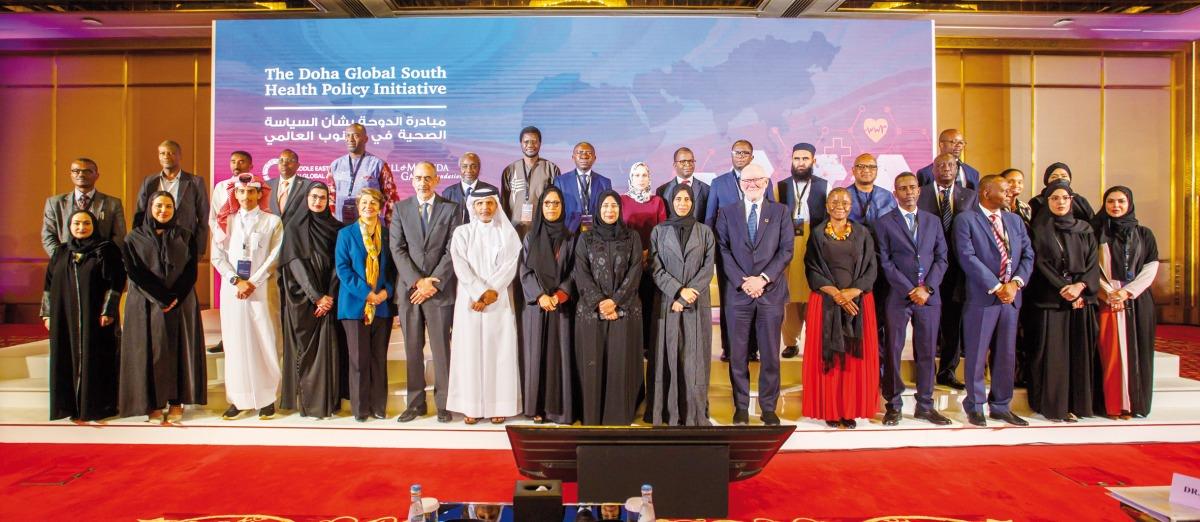
Doha Global South Health Policy Initiative Launched
Doha, Qatar: The Doha Global South Health Policy Initiative was launched yesterday to develop a collaborative platform for countries in the Global South to address their healthcare challenges and find actionable solutions.
The Middle East Council on Global Affairs (ME Council) and the Bill and Melinda Gates Foundation, with the support of the Ministry of Foreign Affairs of Qatar launched the initiative, in the presence of Minister of Public Health, H E Dr. Hanan Mohamed Al Kuwari; Minister of State for International Cooperation at the Ministry of Foreign Affairs, H E Lolwah bint Rashid Al Khater; and several other dignitaries.
Over two days, the meeting in Doha will define the initiative's overall strategy, with inputs from representatives of low- to middle- income countries (LMICs), international experts, and representatives of key Qatari stakeholders including the Ministry of Public Health, the Ministry of Foreign Affairs, Qatar Fund for Development, Qatar University, and Hamad Bin Khalifa University.
Read Also- NCSA launches guidelines for secure adoption and use of AI Doha meeting agrees appointing UN special envoy for Afghanistan Amir lays foundation of $6bn petrochemical project
H E Dr. Hanan Al Kuwari noted that“geographical remoteness, inadequate infrastructure, and a scarcity of trained health workers” are contributing to the challenges in accessing basic health services in some countries despite major improvements in the past decades. She emphasised Qatar's healthcare system has developed and enhanced primary healthcare services and infrastructure over the past decade, with a focus on prevention and early intervention to improve patient outcomes and overall quality of life.
“Qatar's comprehensive globally recognised network of primary healthcare services is a strong example of well-structured health care systems, and our Primary Health Care Corporation stands ready through state programmes to support low- and middle-income countries, to partner with their colleagues for exchange of expertise and training,” said Dr. Al Kuwari.
She expressed her hope that Doha Global South Health Policy Initiative, which aligns perfectly with globally agreed-upon health strategies, will collectively contribute to enhancing primary healthcare in the Global South, investing in their infrastructure, workforce, and resources to empower individuals and communities to take responsibility for their health and well-being.
By facilitating dialogue and knowledge-sharing, the initiative aims to support the achievement of Sustainable Development Goals (SDGs) and addressing unmet healthcare needs in LMICs through both technical expertise and financial support.
In her closing remarks, Al Khater affirmed Qatar's commitment to supporting access to primary healthcare in the Global South, while ensuring that this support improves healthcare and development outcomes.
“Qatar will continue to support access to primary healthcare in the Global South. However, we are also interested in ensuring that this support is as effective as possible in improving healthcare and development outcomes for populations in need,” she said.
She noted the importance of such initiatives for understanding the current barriers limiting progress, by allowing public health administrators and professionals from the Global South to engage more openly and effectively, thus ensuring the success of global efforts.
A panel discussion titled, 'Enhancing Primary Healthcare Access in the Global South: Challenges and Solutions' featured Assistant Minister of Public Health for Health Affairs, Dr. Salih Al Marri; Director of Programme Management at the Eastern Mediterranean Regional Office of WHO, Dr. Rana Hajjeh; Member of the Africa Regional Immunization Technical Advisory Committee at WHO, Deo Nshimirimana; Executive Secretary of the African Leaders Malaria Alliance and Former Minister of Health of Botswana, Joy Phumaphi; and President of the Global Development Division of the Bill and Melinda Gates Foundation, Dr. Chris Elias.
The discussion looked how Qatar's substantial experience and influential position within the World Health Organization and other global bodies can support countries facing challenges in healthcare accessibility.
“Over the last 20 years, the world has cut child mortality in half. Unfortunately, in the last decade, we've seen that progress slow down” said Elias.
“To get back on track with reaching the SDGs, we need a more comprehensive approach that addresses the needs of community health workers and I'm optimistic that through new partnerships like the one launched today in Doha, offering leaders from the Global South a platform to voice their priorities and challenges, we can once again accelerate progress,” he added.

Legal Disclaimer:
MENAFN provides the
information “as is” without warranty of any kind. We do not accept
any responsibility or liability for the accuracy, content, images,
videos, licenses, completeness, legality, or reliability of the information
contained in this article. If you have any complaints or copyright
issues related to this article, kindly contact the provider above.


















Comments
No comment